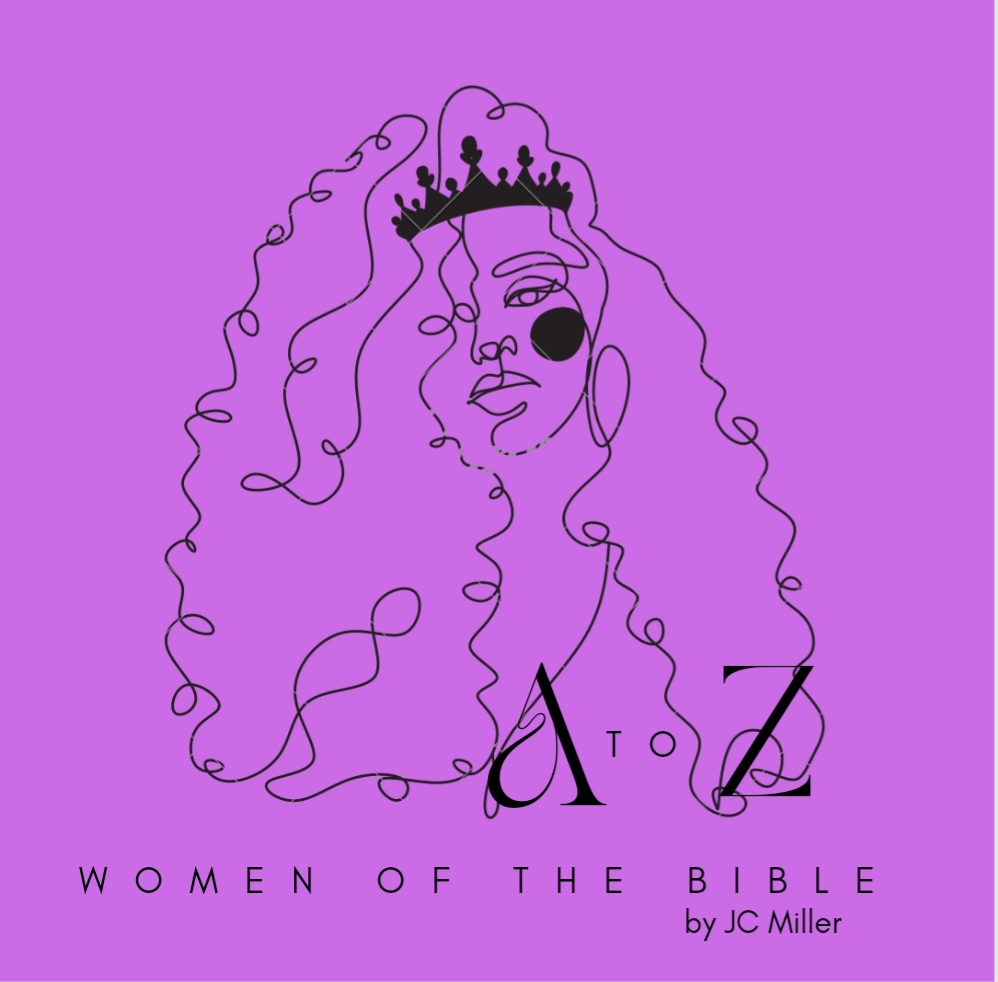Hallelujah, ha-ha-hallelujah. Roll call.
Hallelujah, ha-ha-hallelujah. Roll call.
My name is Esther, yeah it’s the Queen.
I had some opps, trying to plot behind the scenes.
But amen, we defeated Haman.
Saved the Jews and changed the game, man.
Lol. This one was inspired by fellow Tik-Toker, Wande. Hallelujah!
Wulp! We’re five deep in on the Women of the Bible from A to Z; and today’s star is brought to us by the letter E, as in Esther. Hail to the Queen!

Coming in at number six on a list compiled of nine women, Esther is every woman’s favorite. Why? Because she’s like a real life Cinderella or Annie even. It’s a rags to riches story. Or is it?
Here are some interesting trivia facts. The book of Esther is one of two in the Bible named after a woman (the other being Ruth). The biblical account of the orphan girl who grew up to be a courageous queen, is also one of two books that doesn’t actually mention God’s name (the other being Song of Songs). Though we don’t read God’s name in the story, His sovereignty and loving care are obviously woven throughout the chapters. Let’s jump in; we have an entire book to cover.
These events happened in the days of King Xerxes who, at that time, ruled his empire from the fortress of Susa. In the third year of his reign, he gave a banquet for all his nobles and officials. The celebration lasted 180 days, and it was so good that the king threw another one. This time a banquet in the courtyard of the palace garden for all the people in Susa. It lasted for seven days. It probably would have gone longer hadn’t it been for Vashti.

Vashti was the King’s wife. The Queen. She’s infamous for her beauty and declining a grand invitation to dine with her husband. Lol! Vashti literally shut em down — by not showing up to the banquet. I think we all know the story. The King was drunk (in good spirits the Bible says). He asked that Queen Vashti be brought out with the royal crown on her head. He wanted the nobles and all the other men to ‘gaze’ on her beauty. Well, she said, nope! Because I’m a woman!

Here are some thoughts on Vashti to ponder.
- Vashti was actually having a party of her own for all the women in the royal palace. Esther 1:9. The Midrash says that she was a clever politician and that the banquet represented an astute political maneuver.
- It’s said that when the king suggested that she be brought out in her crown, he implied that that’s all she wore.
- I’m adding this one, she was tired of all the ding-dang partying!
Nevertheless, Vashti was deposed and banished from the presence of King Xerxes at his Court’s suggestion. Out of fear they believed that women would begin to despise their husbands when they learned of what Vashti did, and that their own wives would start treating them the same way– with contempt and anger it says. I laugh at that part every time. The audacity.

So, a beauty pageant of sorts was held to find a new queen. The most beautiful girl in the world. The King and his Court agreed that husbands everywhere would receive proper respect if the King chose a new wife. SMH. Esther, an orphan girl, living with her cousin, Mordecai and his family, was chosen from the bunch. It’s said that she was very lovely, even before the year of beauty treatments that she and the other contestants received.

Like the story of Samson and Delilah, Esther’s story is often glamorized. But King Xerxes was a womanizer and tyrant. Here are some facts that maybe you didn’t know.
- Esther and her family were Jewish. Her actual name is Hadassah. It was most likely changed to hide her identity upon becoming Queen of Persia.
- Young Esther was brought up poor in a tumultuous time where she was one of many Jewish children whose parents died.
- When Esther was taken for the King’s beauty contest, she had no choice in the matter.
- She would lose her virginity in the process– whether or not the King chose her as his wife.
- If not chosen, she would become the King’s property––never allowed to return to her life.
- She would never go to the King again unless he had especially enjoyed her and requested her by name.
So a beautiful young girl is chosen by the King to become his new bride and part of his royal harem. Whoopie…in my most cynical tone. So, little orphan Annie moves into the palace. She receives her own wing, maid servants, jewels, and a Punjab!

All the while, Esther continued to keep her family background and nationality a secret, following Mordecai (who had become a palace official) directions.
All was well. But such is life, and in every motion picture, something must go sideways. Two things happened to threaten this Disney-like fairytale.

#1 Cousin Mordecai overheard a plot to assassin the King. He told Queen Esther who in return alerted Xerxes. After an investigation, Mordecai’s story panned out and the men were killed. Mordecai received no credit. (We’ll get back to that)
#2 King Xerxes promoted Haman over all the other nobles, making him the most powerful official in the empire. All the King’s men had to bow down before Haman to show respect whenever he passed by. But Mordecai refused to bow or show him respect. Of course Haman is outraged.
Haman was an Agagite, the descendant of Agag, King of the Amalekites. The Amalekites were ancient enemies of the Israelites. Upon learning of Mordecai’s nationality, Haman convinced the King to issue a decree that the Jews be destroyed. He also donated 10,000 sacks of silver to be deposited in the royal treasury to close the deal. Xerxes agreed and removed his signet ring from his finger and gave it to Haman to do as he pleased. The decree was Signed, Sealed, Delivered.

The Jews in all the provinces that King Xerxes ruled were in an uproar. They fasted, wept, and wailed, and many people lay in burlap and ashes. In short, Queen Esther was told and messages were sent back and forth between her and Mordecai. Her older cousin, who was like a father figure to her, wanted her to reveal her heritage and approach the King on their people’s behalf.

To be courageous was not Queen Esther’s first response to God’s Call. Let’s face it, it’s rarely anyone’s first response? Esther’s reluctance makes her––well, human. In her defense the circumstances were deadly. Anyone who appeared before the King in his inner court without being invited was doomed to die unless he held out his gold scepter.
This is where Mordecai gives his famous “For such a time as this” speech.
“Don’t think for a moment that because you’re in the palace you will escape when all other Jews are killed…”
Ouch!
The Queen was convicted and took her wise cousin’s advice. She waited on God’s timing in prayer, fasting for His direction on how and when to approach the King. Unbeknownst to her, God was already working on Xerxes.

On the third day of the fast, Esther put on her royal robes and entered the inner court of the palace, just across from the King’s hall. Xerxes was sitting on his throne, facing the entrance. When he saw Queen Esther he welcomed her and held out the gold scepter. So Esther approached and touched the end of the scepter.
Then the King asked her, “What do you want, Queen Esther? What is your request? I will give it to you, even if it is half the kingdom!”
And Esther replied, “If it pleases the King, let the King and Haman come today to a banquet I have prepared.”
These people loved to eat and drink! They had such a good time at the banquet that Esther invited them again the next day. She had not yet figured out how to break the news.

That night God used the King’s sleeplessness to cause him to call for the chronicles to be read to him. Remember when Mordecai saved the King’s life, well it was read.
The next day he asked his top official, Haman, “What should I do to honor a man who truly pleases me?”
Haman thought to himself, “Whom would the King wish to honor more than me?”
So he laid it on thick– I mean all the bells and whistles.
Imagine Haman’s surprise when King Xerxes said that Mordecai was the man who pleases him, and furthermore “Quick! Take the robes and my horse, and you do just as you have said for Mordecai the Jew. Leave out nothing you have suggested!”
Womp, Womp, Womp!

Haman was modified and his anger grew. At the suggestion of his wife and friends he had already set up a sharpened seventy-five-foot tall pole to impale Mordecai on. Imagine his insult.
Instead of telling the King of his plans for Mordecai that day, he was forced to parade him around the city square on a royal horse, stating “This is what the King does for someone he wishes to honor!”
That night at Queen Esther’s second banquet, while they were drinking wine, the King again said to Esther, “Tell me what you want, Queen Esther. What is your request? I will give it to you, even if it is half the kingdom!”
Queen Esther replied, “If I have found favor with the King, and if it pleases the King to grant my request, I ask that my life and the lives of my people will be spared…
The queen went on to reveal Haman’s evil plan.
“Who would do such a thing?” King Xerxes demanded. “Who would be so presumptuous as to touch you?”

Esther replied, “This wicked Haman is our adversary and our enemy.”
Ayy, shucks! This is getting good!

The Bible says that Haman turned pale with fear he threw himself at Esther’s mercy. But his fate would meet him that day. Haman was impaled on the pole he erected for Mordecai.
Whatcha see is whatcha get.
And that’s how a little orphan girl from Susa helped in saving the day. What happened with the Jews you ask?
Well, King Xerxes said to Queen Esther and Mordecai the Jew, “I have given Esther the property of Haman, and he has been impaled. Now go ahead and send a message to the Jews in the King’s name, telling them whatever you want, and seal it with my signet ring. But remember that whatever has already been written in the King’s name and sealed with his signet ring can never be revoked.”
So a decree was written exactly as Mordecai dictated. The Jews in every city had the authority to unite to defend their lives. They were allowed to kill, slaughter, and annihilate anyone of any nationality or province who might attack them or their children and wives, and to take the property of their enemies. The decree was sent to the Jews and to the highest officers, the governors, and the nobles of all the provinces stretching from India to Ethiopia. It was written in the languages of all the peoples of the empire in the name of King Xerxes and sealed with his signet ring. Mordecai sent the dispatches by swift messengers, who rode horses especially bred for the King’s service.

The Jews were filled with joy and gladness and were honored everywhere. On the appointed day they struck down their enemies with the sword. But they did not take any plunder.
To this day the Jewish community still celebrates an annual festival and holiday where they rejoice and send gifts of food to each other. The Festival of Purim will never cease to be celebrated nor will the memory of what happened ever die out among their descendants.
What is the lesson of Esther in the Bible?
*Make a commitment to be a good influence. One of the first steps in being a person who has “come for such a time as this” is to make a decision that the Lord can use you to do His work and be an influence for good.
*Always do the right thing, using the influence you possess to help others.
*When you face challenges in life, seek to know what God wants you to do, and then do so, confident that He will do His part.
*Fast and pray. There’s actually an Esther fast observed mostly by the Jewish people.
Where to find Esther in the Bible.
The Book of Esther
Women of the Bible with names starting with E.
E
Eglah – One of King David’s wives.
Elizabeth – Mother of John the Baptist and the wife of Zacharias.
Elisheba – Wife of Aaron.
Ephah – one of the concubines of Caleb (prince of Judah)
Ephrath – Second wife of Caleb (the spy)
Esther – her Hebrew name was Hadassah) – Queen of the Persian Empire in the Hebrew Bible, the queen of Ahasuerus.
Eunice – mother of Timothy
Euodia – Christian of the church in Philippi
Eve – First woman, wife of Adam.



